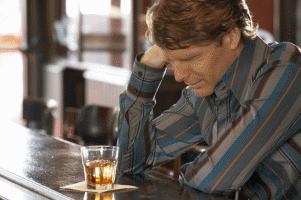Alcoholism and Depression
 There has been a lot of speculation about whether there is a real scientific link between alcoholism and depression through the years.
There has been a lot of speculation about whether there is a real scientific link between alcoholism and depression through the years.
Alcohol abuse statistics show that up to 10% of those who experience chronic depression are also alcoholics. Heavy alcohol consumption directly affects mental function and modifies different brain chemicals as well as and hormonal systems that are involved in the occurrence of several common mental disorders. Research has shown that alcohol has a depressive effect on the brain.
However, if there was a causative relationship between depression and alcoholism, one would expect that most alcoholics would suffer from depression or that most people suffering from depression would become alcoholics.
Since that is not the case, the link between alcoholism and depression is not cut and dried.

Alcoholic Depression The Scientific Link
That doesn’t mean that there isn’t a link between depression and alcohol at all.
It simply means that whatever the link may be, it may not be easily identifiable.
A Harvard study showed that people having signs of alcoholism present had a greater incidence of depression symptoms one year later.
It also showed that the more signs of depression that were present, the greater the likelihood of developing alcoholism. For patients suffering from psychiatric issues, comorbidity — or the presence of other disorders in a single person — is fairly common. Among the most common comorbidities is major depressive disorder and alcohol use disorder. In fact, depressive symptoms are the most common psychiatric conditions among patients with AUD.
Since alcohol is a depressive substance, as we stated earlier, these results are not surprising.
One thing the Harvard study discovered that was surprising was that the link between depression and alcohol showed that women were 3 times more likely to have both conditions than men.

The Difficulty Of Establishing A Connection Between Alcoholism and Depression
There are several reasons why alcoholism and depression might both be present without there being a sign of a causative or genetic link.
Both problems are very common so that gives an increased likelihood of the two occurring together without any significant connection.
|
Self-Medicating with Alcohol
In instances where the depressive symptoms are significant, alcoholism has usually developed as attempts at self-medication.
In an effort to feel better, they drink. The initial buzz can make them feel less depressed at the time, but of course, the depressive effect of alcohol on the brain can make the depression worse after the buzz wears off.
Even those who are not depressed but drink a lot of alcohol can start showing signs of depression due to the depressive action of the alcohol on the central nervous system.
Mixing Alcohol and Anti-Depressants
Although many know that it is very unwise to mix alcohol with anti-depressants, many still go ahead and do it.
Why is this?
Medication for alcoholism takes time to work, typically two to four weeks depending on which particular type you are taking. On top of this there is no guarantee that one anti-depressant will work for a specific person.
Alcohol, on the other hand, relieves feelings of depression almost instantaneously and works for almost everybody, but at a price. If you are on a course of anti-depressants and yet you still feel terrible, turning to alcohol can seem like a good thing to do.
However the consequences of mixing alcohol with antidepressants (and any other medications for that matter) is unpredictable. It may have no outward effects, it may interfere with the workings of the anti-depressant or it may have more serious effects such as drowsiness, disorientation, hallucinations and, in serious cases, coma.
In short if you are taking antidepressants and do not feel any better then contact your physician/psychiatrist/doctor for help and advice, do not turn to drink.
Depression and Alcohol
A Dangerous Cocktail
While there is no proven scientific link between alcoholism and depression, the two together do increase the risks of someone harming themselves or others.
Alcohol causes people to have poor judgment, become impulsive and be less inhibited. This can lead to an individual doing dangerous things, behaving aggressively or even violently.
If someone is already depressed, alcohol can increase the chances of them attempting suicide. Of course, the results of alcoholic behavior can also lead to increasing depression and if allowed to continue alcoholic depression can develop.

Treatment For Alcoholic Depression
If you or your doctor thinks you may be suffering from alcoholic depression then there is only one course of action.
That is to give up drinking. Only then will you know if your depression has been bought on by alcohol or if alcohol has been the medicine you have been taking to attempt to control depressive symptoms.
Do not, though, attempt to give up alcohol without first consulting a doctor/physician. Alcohol withdrawals can be fatal so it is essential to get professional advice before you attempt to detox from alcohol.
Help is Here!
With a lot of alcoholism treatment options available, it could be overwhelming to find the ideal one for you. There are dedicated treatment providers to help you along the way. Please reach out to a treatment provider today to know more about alcoholism and depression treatment.
If you found this page helpful, then the following may be of interest to you:
|

I am a Mental Health Counselor who is licensed in both New York (LMHC) and North Carolina (LCMHC). I have been working in the Mental Health field since 2015. I have worked in a residential setting, an outpatient program and an inpatient addictions program. I began working in Long Island, NY and then in Guelph, Ontario after moving to Canada. I have since settled in North Carolina. I have experience working with various stages of addiction, depression, anxiety, mood disorders, trauma, stages of life concerns and relationship concerns.
I tend to use a person-centered approach which simply means that I meet you where you are and work collaboratively to help you identify and work towards accomplishing goals. I will often pull from CBT when appropriate. I do encourage use of mindfulness and meditation and practice these skills in my own life. I believe in treating everyone with respect, sensitivity and compassion.
I recognize that reaching out for help is hard and commend you for taking the first step. We have professionals available who would be happy to help you move closer to reaching your goals related to your drinking concerns. You may reach these professionals by calling 877-322-2694.
